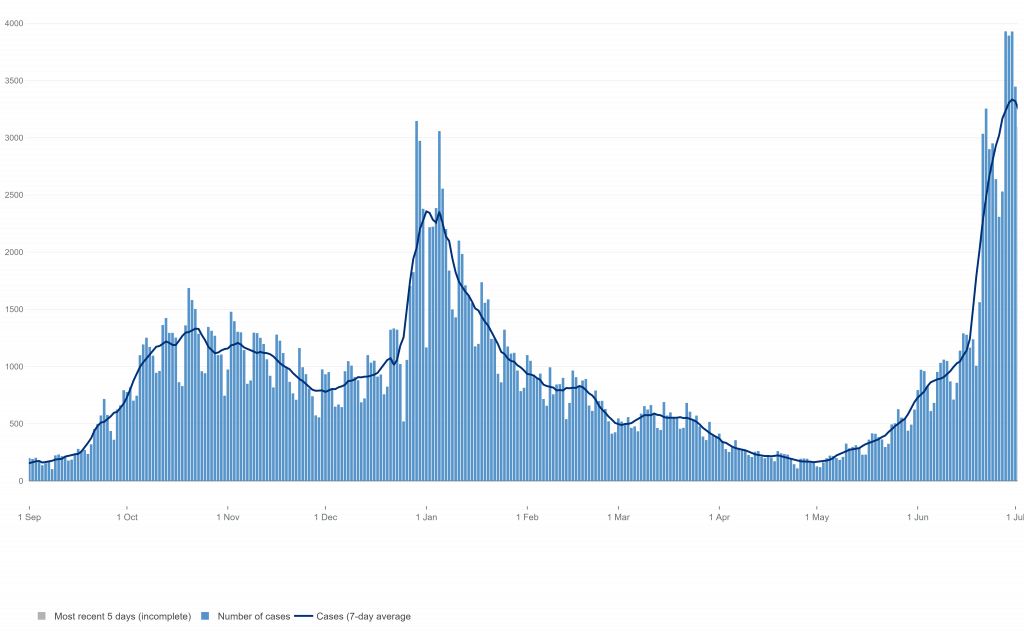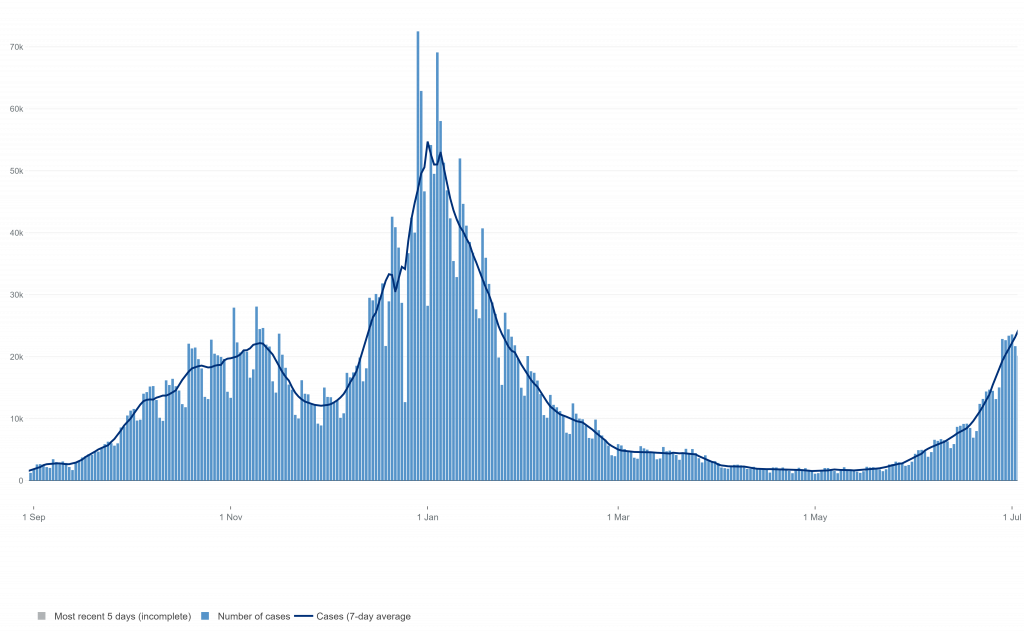Some people are suggesting that the recent surges and drop-offs in Covid infections in England and Scotland can be pinned on the football. The idea is that infections rose as fans mixed during the Euro 2020 championship and declined once Scotland was eliminated and England lost in the final.
It’s true that the summer surges in England and Scotland broadly coincided with when their teams were active in the tournament. Scotland’s new daily infections dropped off a few days after its exit on June 22nd, and England’s a few days after their loss to Italy on July 11th. Also, the male to female ratio of new infections briefly went up during the tournament.
However, that’s about where the coincidences end. The fact that the decline has continued for weeks in Scotland suggests it’s not a short term effect.
Perhaps more important, though, is the different shape of the curves in the two countries during June when both teams were still in the competition.
Scotland saw its daily ‘case’ count hit record highs on June 28th-30th following the team’s three games in the competition.

England also played those three games in the group stage, but by the same point at the end of June the country’s new daily ‘cases’ were a fraction of its winter peak, on a par with autumn levels.

If it was all about the football, why did Scotland’s three matches cause such a spike whereas the same three matches in England caused only a ripple? If the football was the cause you would expect parity of effect in both countries.
Furthermore, after the tournament prevalence was then very high, and the only form of mixing that stopped was watching football. None of the Covid models has suggested that the rate of spread depends entirely on one form of mixing such as this. Is the suggestion really that Covid spreads if and only if there is an international football tournament on? The idea is plainly implausible, but it’s what seems to be implied by the claim that the fall was caused by the end of the Euros.
Mixing to watch football is likely to have contributed to spread in June and July. But how much of that spread would have happened in a similar amount of time anyway? It’s hard to tell.
The lack of correspondence between the curves in England and Scotland during June, when both teams were playing their three group stage games, plus the continued decline in infections in Scotland weeks later, is an indication that football did not play a large role in the rise and fall of the Delta surge in the U.K.











To join in with the discussion please make a donation to The Daily Sceptic.
Profanity and abuse will be removed and may lead to a permanent ban.
Welcome back Gove. How I have missed you.
At last, someone with honesty and integrity – so rare in a politician.
So, selfish am I?
Words cannot describe the visceral hatred I have for you.
Were it not for the assizes I would make it my life’s mission to kill you.
Top Lib Dems In Pocket Of China
https://www.youtube.com/watch?v=8Ww7bEVKkNw
Stand in South Hill Park Bracknell every Sunday from 10am meet fellow anti lockdown freedom lovers, keep yourself sane, make new friends and have a laugh.
Join our Stand in the Park – Bracknell – Telegram Group
http://t.me/astandintheparkbracknell
HOME EDUCATION – Ex-Primary School Teacher on Resistance GB YouTube Channel:
https://www.youtube.com/watch?v=kZ5oS2ejye0
https://www.hopesussex.co.uk/our-mission
that bastion of liberal democracy.
N.B. Vince Cable, insisted recently that he is not an apologist for China but rather we have to learn to live with China.
Who cares? Covid never was exceptional. Irrelevant. Stop giving any credence to any of it.
To be honest I was thinking that if this pandemic was true then a serge of very seriously ill people was on the cards.
Now we get the suggestion that the Euros gave out a load of immunity. Thus proving that lockdowns are not the way to go.
This is not about C1984 and never has been. This is about control.
We have to widen the debate. We have wiped the floor with Government and covid bollox but they have given up even pretending to be honest and simply double down on lies.
This is a Globalist takeover and let’s stop pretending otherwise.
Top Lib Dems In Pocket Of China
https://www.youtube.com/watch?v=8Ww7bEVKkNw
Stand in South Hill Park Bracknell every Sunday from 10am meet fellow anti lockdown freedom lovers, keep yourself sane, make new friends and have a laugh.
Join our Stand in the Park – Bracknell – Telegram Group
http://t.me/astandintheparkbracknell
HOME EDUCATION – Ex-Primary School Teacher on Resistance GB YouTube Channel:
https://www.youtube.com/watch?v=kZ5oS2ejye0
https://www.hopesussex.co.uk/our-mission
I have yet to see a single published, peer reviewed paper that proves, without a shadow of doubt, that Person A has caught covid from Person B. Everything presented to us plebs is just supposition, hypothesis, modelling. Could’s, might’s, likely’s. It’s all crap “science”, not worth the paper it’s written on.
If people stopped getting tested the bloody thing would disappear, simple really.
Couldn’t agree more. Who exactly are these people who get tested in droves anyway? Do you personally know anyone who has had a test recently?
Let’s face it, it isn’t football that is spreading it, if indeed it is being spread, and we are to believe the highly dubious tests. It’s most likely the vaccinated who think that they can just waltz about, free as you like, because they’ve been vaccinated. The idea that if you are vaccinated you can get the very thing you are vaccinated against, only milder, and spread it is completely insane. Every time someone is vaccinated, they walk out into the world like a time-bomb.